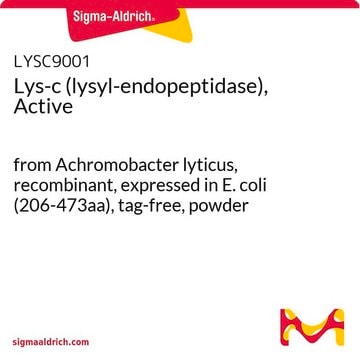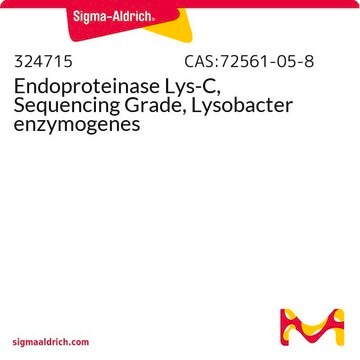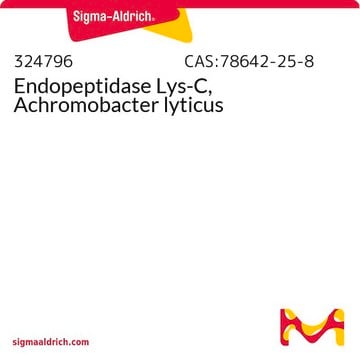LYSC9000
Lys-c (lysyl-endopeptidase), Active
from Achromobacter lyticus, recombinant, expressed in E. coli (206-473aa), tag-free, solution
Synonym(s):
Lys-c (lysyl-endopeptidase), Active, API, Lysyl endopeptidase, Protease I
Sign Into View Organizational & Contract Pricing
All Photos(1)
About This Item
Recommended Products
General description
Recombinant tag-free Achromobacter lyticus Lys-c (lysyl-endopeptidase) (206-473aa) was expressed in E.coli cells.
Overview
Lysyl-endopeptidase (Lys-c) was isolated from the Gram-negative soil bacterium Achromobacter lyticus by Msaki et al. The protein hydrolyzes amide and peptide ester bonds at the carboxylic side of lysine and S-aminoethylcysteine residues making it an important tool for enzymatic protein sequencing and Lys-X compound synthesis.
Overview
Lysyl-endopeptidase (Lys-c) was isolated from the Gram-negative soil bacterium Achromobacter lyticus by Msaki et al. The protein hydrolyzes amide and peptide ester bonds at the carboxylic side of lysine and S-aminoethylcysteine residues making it an important tool for enzymatic protein sequencing and Lys-X compound synthesis.
Specificity
This enzyme hydrolyzes amide and peptide ester bonds at the carboxylic side of lysine and S-aminoethylcysteine residues, at a catalytic pH range of 9.0-9.5, catalytic temperature range of 30-37 °C.
Application
The enzyme functions optimally between 30-37 °C and suffers from degradation when subjected to temperatures above 50 °C. Lysyl-endopeptidase retains complete activity after incubation in 4M urea or in 0.1% SDS solution for up to 6 hours at 30 °C.
Packaging
1mg/ml in Plastic
Preparation Note
Catalytic pH range 9.0-9.5. Catalytic temperature range 30-37 °C.
Storage and Stability
Store product at -20°C for up to one year. Avoid freeze/thaw cycles.
Other Notes
For R&D only.
Storage Class Code
12 - Non Combustible Liquids
WGK
WGK 1
Flash Point(F)
Not applicable
Flash Point(C)
Not applicable
Certificates of Analysis (COA)
Search for Certificates of Analysis (COA) by entering the products Lot/Batch Number. Lot and Batch Numbers can be found on a product’s label following the words ‘Lot’ or ‘Batch’.
Already Own This Product?
Find documentation for the products that you have recently purchased in the Document Library.
Our team of scientists has experience in all areas of research including Life Science, Material Science, Chemical Synthesis, Chromatography, Analytical and many others.
Contact Technical Service







